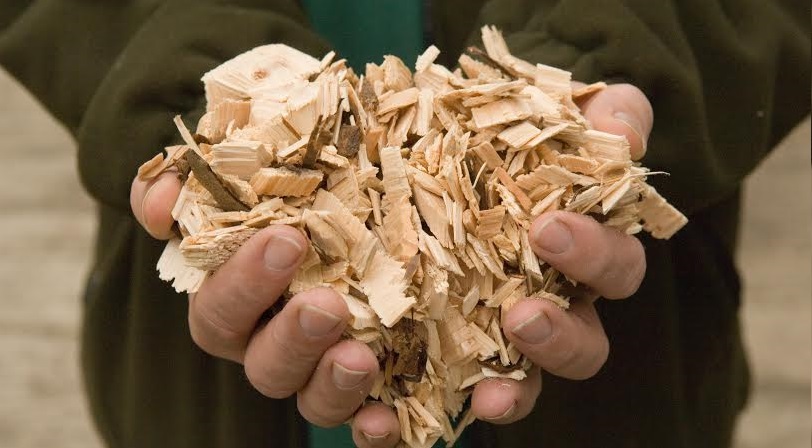
A multi million pound hole in the rural economy has been uncovered by a new survey, which reveals farmers and landowners across England are missing out on millions of pounds of untapped income.
The full extent of this missed opportunity, which is due to landowners failing to reap the rewards of woodfuel and other timber grown on their land, has been revealed by an England-wide survey conducted by the Forestry Commission.
The financial black hole has been revealed as landowners gather at several of the sector’s landmark annual events: Grown in Britain Week (12-18 October), National Forestry Forum and the 2015 National Wood Fuel Conference.
The survey found that 45 per cent of land owners consider their woodland to be less profitable than other parts of their land - with more than a quarter (28 per cent) saying they don’t use their woodlands to generate additional income from the sale of timber, woodfuel or to benefit from reduced heating costs for their own homes and businesses. With the forestry sector already contributing £4.1 billion to the overall UK economy, this missed opportunity represents millions of pounds in additional lost revenue.
The Forestry Commission’s 2015 Forestry Statistics revealed that deliveries of UK roundwood (softwood and hardwood) in 2014 totalled 11.4 million green tonnes – a three per cent increase from 2013 – and private sector softwood production has doubled in the last five years in England alone. Forestry experts expect this trend to continue rising due to the increase in demand for woodfuel since the introduction of the Renewable Heat Incentive (RHI) for non-domestic sectors in 2011.
But while this steady increase is encouraging, it demonstrates that a significant number of woodland owners have yet to understand that potential revenue source on their doorstep. This comes despite many landowners looking for new ways to open up alternative revenue streams from their existing estates.
To help land owners realise the full potential of their woodland and access support, the Forestry Commission has launched the ‘Making Woodlands Work’ campaign. This initiative aims to support landowners and explain how bringing their woodlands into active management will boost income and use their land to its full potential. It will also explain how landowners can receive guidance on how to apply for financial grants and access expertise from leading land management, farming and forestry organisations.
Ian Tubby, Principal Advisor, Business & Markets at the Forestry Commission, said: “Many farms and estates include woodlands, which can form a key part of their business portfolio - but we’ve found that too often the financial benefits of this fantastic asset are being ignored and our colleagues at the CLA and NFU are helping us to turn this around. Whether it’s through timber sales, game shoots or tourism, there’s a vast amount of money that can be generated from woodlands, which many woodland owners are missing out on. And of course, there are ecological benefits to woodland management too such as creating diverse habitats that are richer in wildlife and biodiversity, protecting against pests and diseases, and holding game more effectively.
“An actively managed wood, where the wood yield is harvested in a sustainable way, is a valuable resource that can increase the estate’s capital value, help to boost income – and even turn a profit. The forestry sector already contributes billions to the UK economy and plays a key role in the production of woodfuel. This is why we’re working closely with the land management and forestry sector to help woodland owners take that first step. This action will enable them to make more of the untapped potential in their woods, support their short-term and long-term commercial objectives, plus boost jobs and skills training across the sector.”
Dougal Driver, Grown in Britain CEO commented: “Grown in Britain has created significant demand for branded wood based products from well managed woodlands and forests in the UK and so the Forestry Commission's Making Woodlands Work campaign is essential to increase the levels of woodland management.
“Grown in Britain has started to connect society to the importance of woodland management, and to celebrate the sights and sounds of forest operations and how the resultant woods with more light and varied structure are better for wildlife, recreation and local jobs.
“Using home-grown timber is not only great for our own woodlands but every product we grow here substitutes a product shipped in from around the world providing benefits for local communities, the environment and our wider economy.”
Leading forestry organisations, such as the Forestry Commission, can support woodland owners to create a UK Forestry Standard compliant Management Plan and help with felling licences. Woodland owners can also access grants to help them develop their management plans via the Rural Development Programme for England (RDPE). Land managers who want to apply for funding through the RDPE to improve their woodland in 2016 should prepare now by putting a management plan in place.
The Institute of Chartered Foresters, in partnership with the Forestry Commission, is hosting a series of workshops to help woodland owners and forestry professionals learn more about the new Countryside Stewardship scheme and guide participants through the application requirements.
